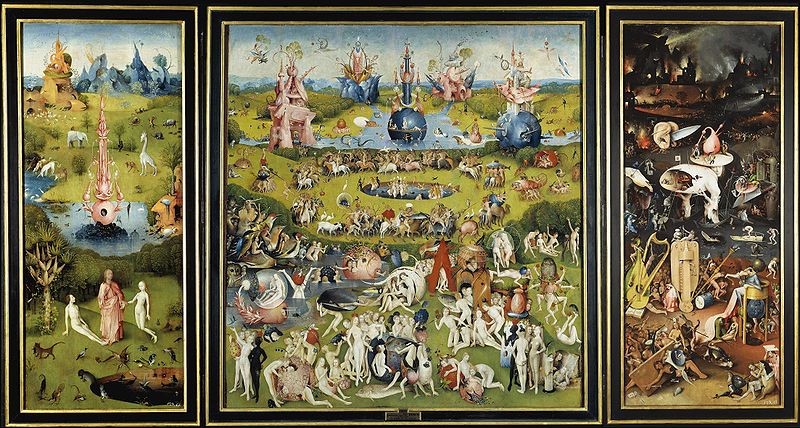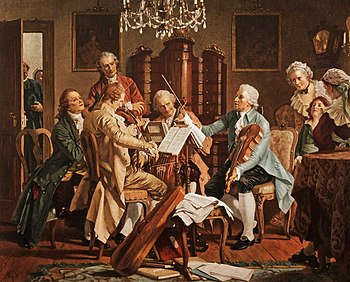
Tuesday, October 27, 2009
Featured Painting
The Garden of Earthly Delights (or The Millennium), is a triptych painted by the early Netherlandish master Hieronymus Bosch (c. 1450–1516), housed in the Museo del Prado in Madrid since 1939. Dating between 1503 and 1504, when Bosch was about 50 years old, it is his best-known and most ambitious work. The masterpiece reveals the artist at the height of his powers; in no other painting does he achieve such complexity of meaning or such vivid imagery. The triptych depicts several Biblical scenes on a grand scale and as a "true triptych", as defined by Hans Belting, was probably intended to illustrate the history of mankind according to medieval Christian doctrine.


Gabriel García Márquez
A Colombian novelist, short-story writer, screenwriter and journalist. García Márquez, affectionately known as "Gabo" throughout Latin America, is considered one of the most significant authors of the 20th century. In 1982, he was awarded the Nobel Prize in Literature. He pursued a self-directed education that resulted in his leaving law school for a career in journalism. From early on, he showed no inhibitions in his criticism of Colombian and foreign politics. In 1958, he married Mercedes Barcha; they have two sons, Rodrigo and Gonzalo.
He started as a journalist, and has written many acclaimed non-fiction works and short stories, but is best-known for his novels, such as One Hundred Years of Solitude (1967) and Love in the Time of Cholera (1985). His works have achieved significant critical acclaim and widespread commercial success, most notably for popularizing a literary style labeled as magical realism, which uses magical elements and events in otherwise ordinary and realistic situations. Some of his works are set in a fictional village called Macondo, and most of them express the theme of solitude.
He started as a journalist, and has written many acclaimed non-fiction works and short stories, but is best-known for his novels, such as One Hundred Years of Solitude (1967) and Love in the Time of Cholera (1985). His works have achieved significant critical acclaim and widespread commercial success, most notably for popularizing a literary style labeled as magical realism, which uses magical elements and events in otherwise ordinary and realistic situations. Some of his works are set in a fictional village called Macondo, and most of them express the theme of solitude.
Wednesday, August 12, 2009
Dokkōdō
The precepts
1. Accept everything just the way it is.
2. Do not seek pleasure for its own sake.
3. Do not, under any circumstances, depend on a partial feeling.
4. Think lightly of yourself and deeply of the world.
5. Be detached from desire your whole life long.
6. Do not regret what you have done.
7. Never be jealous.
8. Never let yourself be saddened by a separation.
9. Resentment and complaint are appropriate neither for oneself nor others.
10. Do not let yourself be guided by the feeling of lust or love.
11. In all things have no preferences.
12. Be indifferent to where you live.
13. Do not pursue the taste of good food.
14. Do not hold on to possessions you no longer need.
15. Do not act following customary beliefs.
16. Do not collect weapons or practice with weapons beyond what is useful.
17. Do not fear death.
18. Do not seek to possess either goods or fiefs for your old age.
19. Respect Buddha and the gods without counting on their help.
20. You may abandon your own body but you must preserve your honour.
21. Never stray from the Way.
1. Accept everything just the way it is.
2. Do not seek pleasure for its own sake.
3. Do not, under any circumstances, depend on a partial feeling.
4. Think lightly of yourself and deeply of the world.
5. Be detached from desire your whole life long.
6. Do not regret what you have done.
7. Never be jealous.
8. Never let yourself be saddened by a separation.
9. Resentment and complaint are appropriate neither for oneself nor others.
10. Do not let yourself be guided by the feeling of lust or love.
11. In all things have no preferences.
12. Be indifferent to where you live.
13. Do not pursue the taste of good food.
14. Do not hold on to possessions you no longer need.
15. Do not act following customary beliefs.
16. Do not collect weapons or practice with weapons beyond what is useful.
17. Do not fear death.
18. Do not seek to possess either goods or fiefs for your old age.
19. Respect Buddha and the gods without counting on their help.
20. You may abandon your own body but you must preserve your honour.
21. Never stray from the Way.
Search
Look before asking. If you look, you are likely to find, but if you ask, you find nothing yourself.
Monday, August 3, 2009
Sunday, August 2, 2009
Self Help
If you're in a self help aisle, you can't help yourself, that's why you're looking for help.
Sunday, June 28, 2009
New Featured Paintings Series
This series will include some of the great painting I've seen at the Museo de Arte de Puerto Rico. These paintings succeed in expressing the great virtues of the working people not only in Puerto Rico, but all over Latin America. The first painter is the greatest of the contemporary artists from the Island, Luis Hernández Cruz.
Danza Ritual [1989]

Danza Ritual [1989]

Sunday, April 12, 2009
The First Question of Philosophy
Is it love, or death? The stimulus could be, why has this person disappeared, or is it rather, what is this feeling I have for another? Perhaps it is both.
Thursday, March 26, 2009
Hegel
The Kantian-Hegelian-Marxist tradition has proved extremely influential up to our present time. This post will focus on the middle of these titans of German philosophy, G.W.F. Hegel. Here are Hegel's thoughts on "Universal History":
"The German spirit is the Spirit of the New World. Its aim is the realization of absolute Truth as the unlimited self-determination of Freedom....The destiny of the German peoples is to be the bearers of the Christian principle...of Spiritual Freedom."
[Hegel, Philosophy of History]
Hegel views history as the "development of the idea of freedom." Here, he is intertwining his idea of history with the destiny of the German people.
"The German spirit is the Spirit of the New World. Its aim is the realization of absolute Truth as the unlimited self-determination of Freedom....The destiny of the German peoples is to be the bearers of the Christian principle...of Spiritual Freedom."
[Hegel, Philosophy of History]
Hegel views history as the "development of the idea of freedom." Here, he is intertwining his idea of history with the destiny of the German people.
Wednesday, March 11, 2009
Featured Painting
I apologize for my neglect of this blog of late. Here is the featured painting, and painter, of the week:
Transfiguration
by: Raphael [1520]
Raphael Sanzio, usually known by his first name alone (in Italian Raffaello; April 6 or March 28, 1483 – April 6, 1520) was an Italian painter and architect of the High Renaissance, celebrated for the perfection and grace of his paintings and drawings. Together with Michelangelo and Leonardo da Vinci, he forms the traditional trinity of great masters of that period. [courtesy Wikipedia.]

Transfiguration
by: Raphael [1520]
Raphael Sanzio, usually known by his first name alone (in Italian Raffaello; April 6 or March 28, 1483 – April 6, 1520) was an Italian painter and architect of the High Renaissance, celebrated for the perfection and grace of his paintings and drawings. Together with Michelangelo and Leonardo da Vinci, he forms the traditional trinity of great masters of that period. [courtesy Wikipedia.]

Goethe
"There is nothing more terrible than the succession of fair days."
Is unhappiness a necessary part of the human condition? Is it our nature? Maybe, it is the exterior forces around us.
Is unhappiness a necessary part of the human condition? Is it our nature? Maybe, it is the exterior forces around us.
Pain
What is pain? Rather, what does it mean to say, "I feel pain." Does anyone actually understand when we make these statements? I don't know, but I think, understanding could be the wrong approach. Perhaps, only by accepting our inability to understand the pain of others, or even the word "pain", can we then begin to understand.
Tuesday, January 27, 2009
Saturday, January 10, 2009
Status Quo
"I'm not interested in preserving the status quo; I want to overthrow it."
-Niccolo Machiavelli
-Niccolo Machiavelli
Subscribe to:
Posts (Atom)
